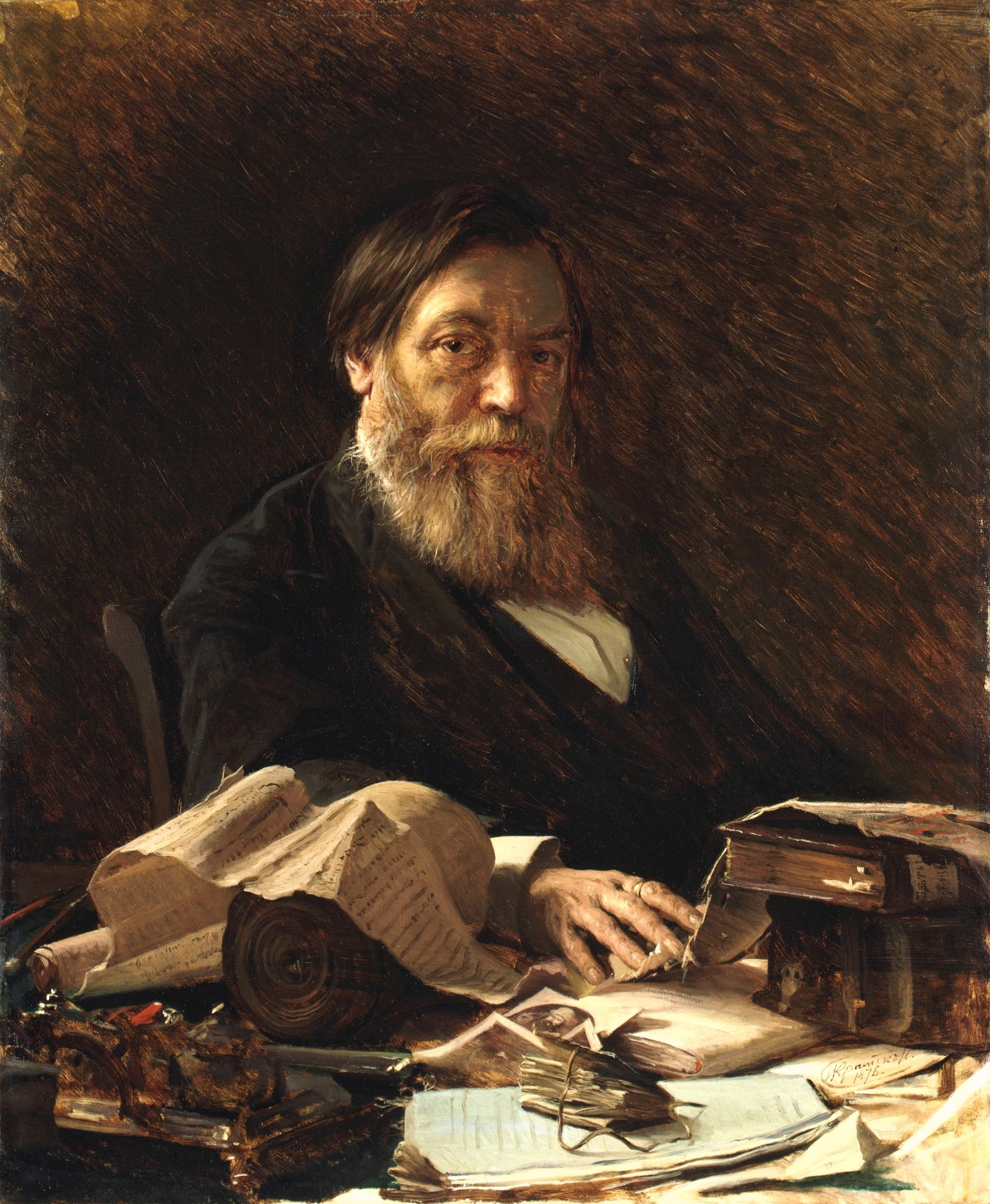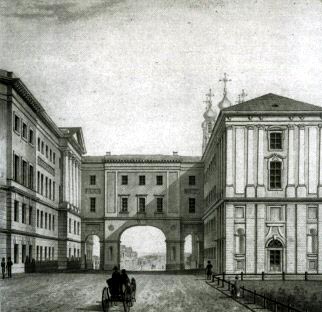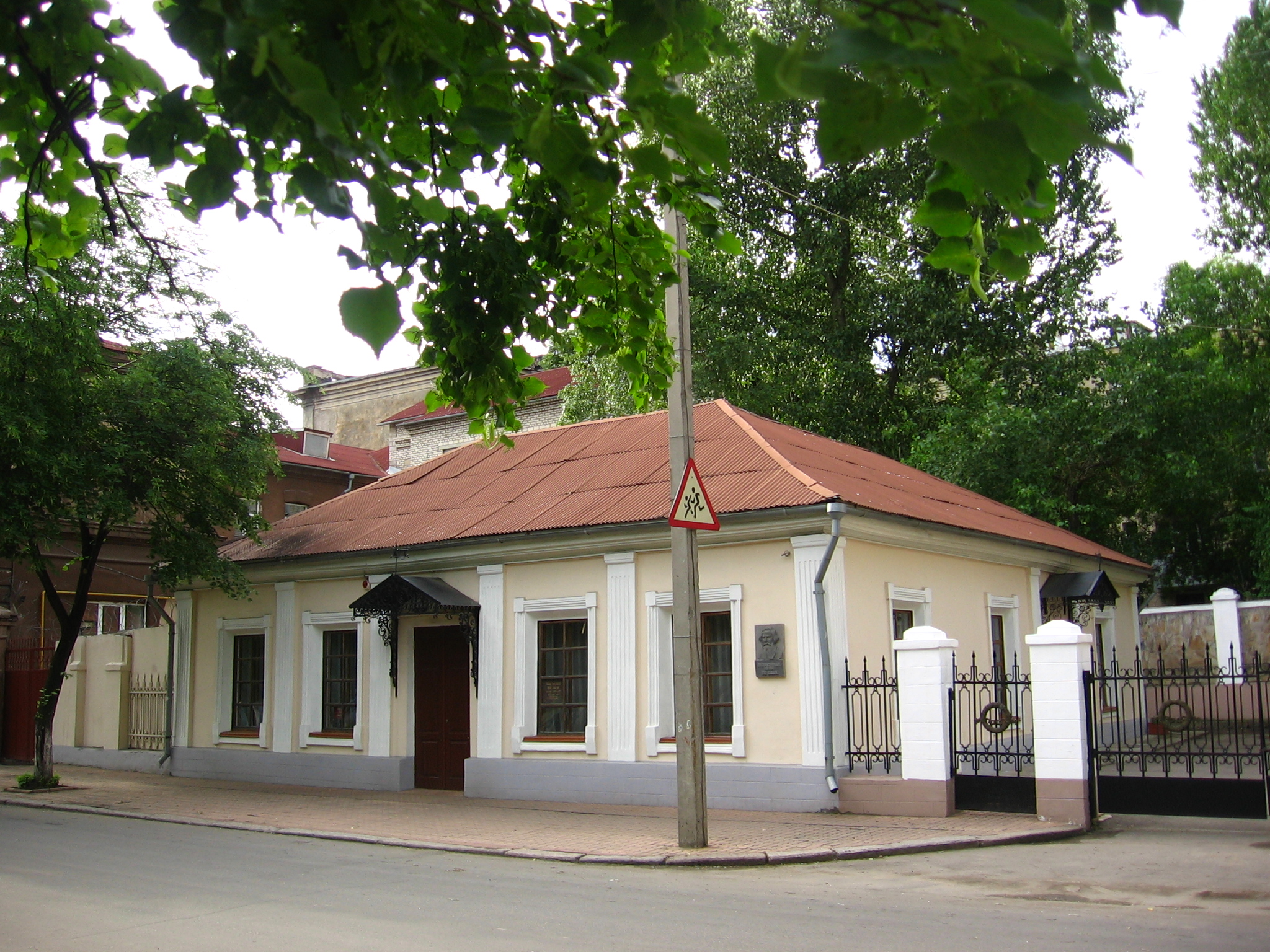|
Pavel Ivanovich Melnikov
Pavel Ivanovich Melnikov (alias Andrey Pechersky, russian: Па́вел Ива́нович Ме́льников (Андре́й Пече́рский), 1818, Nizhny Novgorod – 1883) was a Russian writer, best known for his novels ''In the Forests'' and ''On the Hills'', which describe the unique life of Transvolga and use its dialects. Biography Pavel Ivanovich Melnikov was born in Nizhny Novgorod to a noble family of moderate means and spent his early years in Semyonov, a small provincial town. His childhood impressions, pictures of Transvolga, its common people's ways of life had a strong impact upon his later worldview. In 1834 he enrolled at the Kazan University's philological faculty and graduated in 1837. As a student he became interested in the works of Alexander Pushkin and Nikolai Gogol, as well as Vissarion Belinsky's critical essays. Melnikov was about to embark upon the academic career at the university when for some kind of wrongdoing (the nature of which remains ... [...More Info...] [...Related Items...] OR: [Wikipedia] [Google] [Baidu] |
Kazan University
Kazan (Volga region) Federal University (russian: Казанский (Приволжский) федеральный университет, tt-Cyrl, Казан (Идел буе) федераль университеты) is a public research university located in Kazan, Russia. Founded in 1804 as Imperial Kazan University, astronomer Nikolai Ivanovich Lobachevsky served there as the rector from 1837 until 1876. In 1929, the university was renamed in honour of its student Vladimir Ilyich Ulyanov (Lenin). The university is known as the birthplace of organic chemistry due to works by Aleksandr Butlerov, Vladimir Markovnikov, Aleksandr Arbuzov, and the birthplace of electron spin resonance discovered by Evgeny Zavoisky. In 2011, Kazan University received a federal status. It is also one of 18 Russian universities that were initially selected to participate in the Project 5-100, coordinated by the Government of the Russian Federation and aimed to improve their international competit ... [...More Info...] [...Related Items...] OR: [Wikipedia] [Google] [Baidu] |
Old Believers
Old Believers or Old Ritualists, ''starovery'' or ''staroobryadtsy'' are Eastern Orthodox Christians who maintain the liturgical and ritual practices of the Russian Orthodox Church as they were before the reforms of Patriarch Nikon of Moscow between 1652 and 1666. Resisting the accommodation of Russian piety to the contemporary forms of Greek Orthodox worship, these Christians were anathematized, together with their ritual, in a Synod of 1666–67, producing a division in Eastern Europe between the Old Believers and those who followed the state church in its condemnation of the Old Rite. Russian speakers refer to the schism itself as ''raskol'' (), etymologically indicating a "cleaving-apart". Introduction In 1652, Patriarch Nikon (1605–1681; patriarch of the Russian Orthodox Church from 1652 to 1658) introduced a number of ritual and textual revisions with the aim of achieving uniformity between the practices of the Russian and Greek Orthodox churches. Nikon, having notice ... [...More Info...] [...Related Items...] OR: [Wikipedia] [Google] [Baidu] |
Saltykov-Schedrin
Mikhail Yevgrafovich Saltykov-Shchedrin ( rus, Михаи́л Евгра́фович Салтыко́в-Щедри́н, p=mʲɪxɐˈil jɪvˈɡrafəvʲɪtɕ səltɨˈkof ɕːɪˈdrʲin; – ), born Mikhail Yevgrafovich Saltykov and known during his lifetime by the pen name Nikolai Shchedrin ( rus, Николай Щедрин), was a major Russian writer and satirist of the 19th century. He spent most of his life working as a civil servant in various capacities. After the death of poet Nikolay Nekrasov, he acted as editor of a Russian literary magazine ''Otechestvenniye Zapiski'' until the Tsarist government banned it in 1884. In his works Saltykov mastered both stark realism and satirical grotesque merged with fantasy. His most famous works, the family chronicle novel ''The Golovlyov Family'' (1880) and the political novel ''The History of a Town'' (1870) became important works of 19th-century fiction, and Saltykov is regarded as a major figure of Russian literary Realism. Bi ... [...More Info...] [...Related Items...] OR: [Wikipedia] [Google] [Baidu] |
Nikolai Chernyshevsky
Nikolay Gavrilovich Chernyshevsky ( – ) was a Russian literary and social critic, journalist, novelist, democrat, and socialist philosopher, often identified as a utopian socialist and leading theoretician of Russian nihilism. He was the dominant intellectual figure of the 1860s revolutionary democratic movement in Russia, despite spending much of his later life in exile to Siberia, and was later highly praised by Karl Marx, Georgi Plekhanov, and Vladimir Lenin. Biography The son of a priest, Chernyshevsky was born in Saratov in 1828, and stayed there until 1846. He graduated at the local seminary where he learned English, French, German, Italian, Latin, Greek and Old Slavonic. It was there he gained a love of literature. At St Petersburg University he often struggled to warm his room. He kept a diary of trivia like the number of tears he shed over a dead friend. It was here that he became an atheist. He was inspired by the works of Hegel, Ludwig Feuerbach and Charles ... [...More Info...] [...Related Items...] OR: [Wikipedia] [Google] [Baidu] |
Natural School
Natural School (russian: Натуральная школа, Naturalnaya Shkola) is a term applied to the literary movement which arose under the influence of Nikolai Gogol in the 1840s in Russia, and included such diverse authors as Nikolai Nekrasov, Ivan Panayev, Dmitry Grigorovich, Ivan Turgenev, Alexander Hertzen, Ivan Goncharov, Vladimir Dal, Mikhail Saltykov-Shchedrin, Fyodor Dostoyevsky and Evgeny Grebyonka, among others. Modern day Russian historians of literature use the term only in its historical context, otherwise preferring to speak of "the earliest stage of critical realism in Russia." History The label Natural School was coined by Faddey Bulgarin, who initially used it in a derogatory sense. In an essay of February 26 1846, in '' Severnaya Ptchela'', Bulgarin criticized young writers—followers of Gogol—for producing prose that imitated real life but lacked artistry and inspiration. The term was picked up and used in a positive sense by Vissarion Belinsky, in relat ... [...More Info...] [...Related Items...] OR: [Wikipedia] [Google] [Baidu] |
Serfdom
Serfdom was the status of many peasants under feudalism, specifically relating to manorialism, and similar systems. It was a condition of debt bondage and indentured servitude with similarities to and differences from slavery, which developed during the Late Antiquity and Early Middle Ages in Europe and lasted in some countries until the mid-19th century. Unlike slaves, serfs could not be bought, sold, or traded individually though they could, depending on the area, be sold together with land. The kholops in Russia, by contrast, could be traded like regular slaves, could be abused with no rights over their own bodies, could not leave the land they were bound to, and could marry only with their lord's permission. Serfs who occupied a plot of land were required to work for the lord of the manor who owned that land. In return, they were entitled to protection, justice, and the right to cultivate certain fields within the manor to maintain their own subsistence. Serfs were ofte ... [...More Info...] [...Related Items...] OR: [Wikipedia] [Google] [Baidu] |
Russky Vestnik
The ''Russian Messenger'' or ''Russian Herald'' (russian: Ру́сский ве́стник ''Russkiy Vestnik'', Pre-reform Russian: Русскій Вѣстникъ ''Russkiy Vestnik'') has been the title of three notable magazines published in Russia during the 19th century and early 20th century. ''Russian Messenger'' period I and II The first publishing period of the ''Russian Messenger'' falls within the period 1808 to 1820, and 1824. Relocated to Moscow, the monthly journal was edited by writer Sergey Glinka. It was sponsored by the minister and adjutant general Count Fyodor Rostopchin and its orientation classified as patriotic monarchist. The second publishing period falls in the years from 1841 to 1844 and appeared in Saint Petersburg. On its creation, the publisher, editor, journalist and publicist Nikolay Gretsch and writer, playwright, journalist and historian Nikolai Polevoy were involved. Another employee was the historian Ivan Snegiryov. ''Russian Messenger'' pe ... [...More Info...] [...Related Items...] OR: [Wikipedia] [Google] [Baidu] |
Moskvityanin
''Moskvityanin'' (Москвитянин, "The Muscovite") was a monthly literary review published by Mikhail Pogodin in Moscow between 1841 and 1856., , , , It was the mouthpiece of the Official Nationality theory espoused by Count Sergey Uvarov. The literary section was edited by Stepan Shevyrev. Nikolai Gogol, Gogol's novella ''Rome'' was first printed in ''Moskvityanin'', as were many Slavophile papers. In 1850 the magazine was taken over by a young generation of Slavophiles which included Apollon Grigoryev. Their object of adulation was Alexander Ostrovsky. The frequency of the magazine switched from monthly to biweekly in 1849. References 1841 establishments in the Russian Empire 1856 disestablishments in the Russian Empire Biweekly magazines Defunct literary magazines published in Europe Defunct magazines published in Russia Magazines established in 1841 Magazines disestablished in 1856 Magazines published in Moscow Literary magazines published in Russia Russian-lan ... [...More Info...] [...Related Items...] OR: [Wikipedia] [Google] [Baidu] |
Vladimir Dal
Vladimir Ivanovich Dal ( rus, Влади́мир Ива́нович Даль, p=vlɐˈdʲimʲɪr ɨˈvanəvʲɪdʑ ˈdalʲ; November 22, 1801 – October 4, 1872) was a noted Russian-language lexicographer, polyglot, Turkologist, and founding member of the Russian Geographical Society. During his lifetime he compiled and documented the oral history of the region that was later published in Russian and became part of modern folklore. Early life Vladimir Dal's father was a Danish physician named Johan Christian von Dahl (1764 – October 21, 1821), a linguist versed in the German, English, French, Russian, Yiddish, Latin, Greek and Hebrew languages. His mother, Julia Adelaide Freytag, had German and probably French (Huguenot) ancestry; she spoke at least five languages and came from a family of scholars. The future lexicographer was born in the town of Lugansky Zavod (present-day Luhansk, Ukraine), in Novorossiya - then under the jurisdiction of Yekaterinoslav Governorate, part ... [...More Info...] [...Related Items...] OR: [Wikipedia] [Google] [Baidu] |
Alexander Hertzen
Alexander Ivanovich Herzen (russian: Алекса́ндр Ива́нович Ге́рцен, translit=Alexándr Ivánovich Gértsen; ) was a Russian writer and thinker known as the "father of Russian socialism" and one of the main fathers of agrarian populism (being an ideological ancestor of the Narodniki, Socialist-Revolutionaries, Trudoviks and the agrarian American Populist Party). With his writings, many composed while exiled in London, he attempted to influence the situation in Russia, contributing to a political climate that led to the emancipation of the serfs in 1861. He published the important social novel '' Who is to Blame?'' (1845–46). His autobiography, '' My Past and Thoughts'' (written 1852–1870), is often considered one of the best examples of that genre in Russian literature. Life Herzen (or Gertsen) was born out of wedlock to a rich Russian landowner, Ivan Yakovlev, and Henriette Wilhelmina Luisa Haag from Stuttgart. Yakovlev supposedly gave his son the s ... [...More Info...] [...Related Items...] OR: [Wikipedia] [Google] [Baidu] |
Grand Duke Konstantin Nikolayevich Of Russia
Grand Duke Konstantin Nikolayevich of Russia (21 September 1827 – 25 January 1892) was the Emperor's Viceroy of Poland from 1862 to 1863. Early life Konstantin Nikolayevich was born as the second son of Nicholas I and his wife, Charlotte of Prussia, daughter of Frederick William III of Prussia and his first wife, Louise of Mecklenburg-Strelitz. Biography The Grand Duke was a supporter of the liberal (sometimes referred to as "enlightened") bureaucrats during the period of his brother Alexander II's great reforms. He served as chairman of the Imperial Russian Geographical Society (founded in 1845). The Geographical Society was subordinate to the Ministry of Internal Affairs, which was home to a conspicuous number of , including Nikolai Miliutin. In addition to his support of and participation in the 1861 emancipation of the serfs, the Grand Duke also instituted reforms in the Imperial Russian Navy from 1854. Konstantin's brother, Alexander II of Russia was supposed ... [...More Info...] [...Related Items...] OR: [Wikipedia] [Google] [Baidu] |
Nicholas I Of Russia
Nicholas I , group=pron ( – ) was List of Russian rulers, Emperor of Russia, Congress Poland, King of Congress Poland and Grand Duke of Finland. He was the third son of Paul I of Russia, Paul I and younger brother of his predecessor, Alexander I of Russia, Alexander I. Nicholas inherited his brother's throne despite the failed Decembrist revolt against him. He is mainly remembered in history as a reactionary whose controversial reign was marked by geographical expansion, economic growth, and massive industrialisation on the one hand, and centralisation of administrative policies and repression of dissent on the other. Nicholas had a happy marriage that produced a large family; all of their seven children survived childhood. Nicholas's biographer Nicholas V. Riasanovsky said that he displayed determination, singleness of purpose, and an iron will, along with a powerful sense of duty and a dedication to very hard work. He saw himself as a soldier—a junior officer totally consumed ... [...More Info...] [...Related Items...] OR: [Wikipedia] [Google] [Baidu] |







_(1830s%2C_GIM).jpg)
